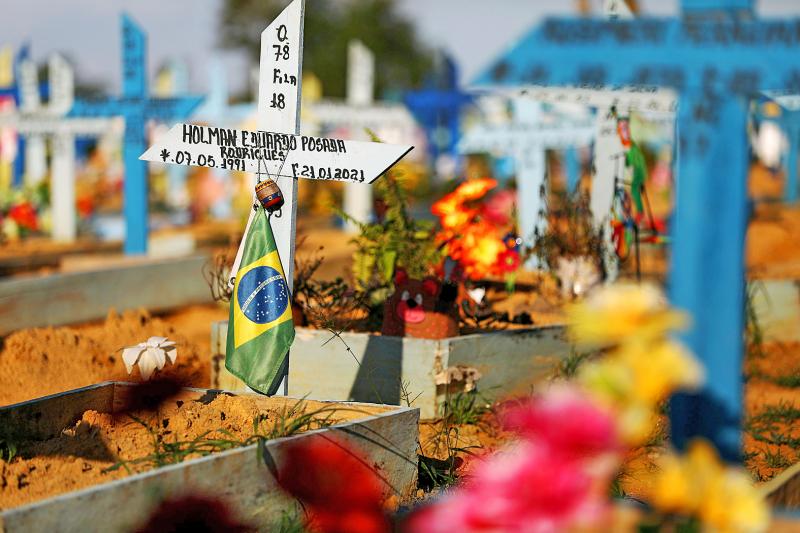Latin America and the Caribbean on Friday passed 1 million COVID-19 deaths as the IMF proposed a US$50 billion plan to end the pandemic, aiming to expand global immunization drives.
Since COVID-19 was first detected in Latin America in Sao Paulo in late February last year, Agence France-Presse has recorded more than 1,001,400 fatalities — almost 30 percent of the global total — and more than 31.5 million cases.
Nearly 90 percent of those deaths have been recorded in just five countries: Brazil, Mexico, Colombia, Argentina and Peru.

Photo: Reuters
“People aren’t taking care, none of us are being careful and we want to go out and travel,” said Alicia Sepulveda, a resident of Buenos Aires, Argentina, which went on a nine-day lockdown beginning yesterday after Argentine President Alberto Fernandez said it was facing its “worst moment” yet in the pandemic.
Latin America suffers from a lack of access to vaccines and medical supplies, and has only finished immunizing 3 percent of its population, according to the Pan American Health Organization.
Globally, the real number of dead from the pandemic was “at least two to three times higher than officially reported,” Samira Asma, the WHO’s assistant director-general in charge of data, told reporters.
In Washington, the IMF proposed a US$50 billion recovery plan with the aim of having at least 60 percent of the world’s population vaccinated by the end of next year.
The amount pales in comparison to the massive stimulus rolled out by rich nations, including the latest US$1.9 trillion US package.
“One of the key messages of this proposal is that the amount that’s needed is not very big,” IMF chief economist Gita Gopinath said.
Meanwhile, vaccine firms pledged to supply billions of doses to poorer nations by the end of next year at the Global Health Summit in Rome, which was part of the G20 talks.
Vaccine makers Pfizer, Moderna and Johnson & Johnson promised 3.5 billion doses at cost or discount to middle and low-income countries this year and next.
“It is a very clear ‘no’ to health nationalism,” European Commission President Ursula von der Leyen told the G20 after the EU pledged 100 million doses and to invest in manufacturing hubs in Africa to reduce reliance on imports.
Germany chipped in later on Friday, donating 30 million doses to poorer countries this year.
Vaccines are offering hope that nations can finally emerge from the pandemic that has ravaged the global economy and killed more than 3.4 million people since the end of 2019.
In Europe, the tourism sector looked on track to start a cautious resumption as Spain said it would open its borders to all immunized travelers from June 7.
Spanish Prime Minister Pedro Sanchez also said that all British travelers would be welcomed in for holidays — without even needing to present a negative COVID-19 test.
However, in sharp contrast, Germany said it would from today require people arriving from the UK to quarantine for two weeks because of the spread there of a coronavirus variant first found in India.
Germany on Friday opened beer gardens, terraces and pools in some parts of the country for the first time in months.

A Chinese aircraft carrier group entered Japan’s economic waters over the weekend, before exiting to conduct drills involving fighter jets, the Japanese Ministry of Defense said yesterday. The Liaoning aircraft carrier, two missile destroyers and one fast combat supply ship sailed about 300km southwest of Japan’s easternmost island of Minamitori on Saturday, a ministry statement said. It was the first time a Chinese aircraft carrier had entered that part of Japan’s exclusive economic zone (EEZ), a ministry spokesman said. “We think the Chinese military is trying to improve its operational capability and ability to conduct operations in distant areas,” the spokesman said. China’s growing

Nine retired generals from Taiwan, Japan and the US have been invited to participate in a tabletop exercise hosted by the Taipei School of Economics and Political Science Foundation tomorrow and Wednesday that simulates a potential Chinese invasion of Taiwan in 2030, the foundation said yesterday. The five retired Taiwanese generals would include retired admiral Lee Hsi-min (李喜明), joined by retired US Navy admiral Michael Mullen and former chief of staff of the Japan Self-Defense Forces general Shigeru Iwasaki, it said. The simulation aims to offer strategic insights into regional security and peace in the Taiwan Strait, it added. Foundation chair Huang Huang-hsiung

PUBLIC WARNING: The two students had been tricked into going to Hong Kong for a ‘high-paying’ job, which sent them to a scam center in Cambodia Police warned the public not to trust job advertisements touting high pay abroad following the return of two college students over the weekend who had been trafficked and forced to work at a cyberscam center in Cambodia. The two victims, surnamed Lee (李), 18, and Lin (林), 19, were interviewed by police after landing in Taiwan on Saturday. Taichung’s Chingshui Police Precinct said in a statement yesterday that the two students are good friends, and Lin had suspended her studies after seeing the ad promising good pay to work in Hong Kong. Lee’s grandfather on Thursday reported to police that Lee had sent

BUILDUP: US General Dan Caine said Chinese military maneuvers are not routine exercises, but instead are ‘rehearsals for a forced unification’ with Taiwan China poses an increasingly aggressive threat to the US and deterring Beijing is the Pentagon’s top regional priority amid its rapid military buildup and invasion drills near Taiwan, US Secretary of Defense Pete Hegseth said on Tuesday. “Our pacing threat is communist China,” Hegseth told the US House of Representatives Appropriations Subcommittee on Defense during an oversight hearing with US General Dan Caine, chairman of the Joint Chiefs of Staff. “Beijing is preparing for war in the Indo-Pacific as part of its broader strategy to dominate that region and then the world,” Hegseth said, adding that if it succeeds, it could derail